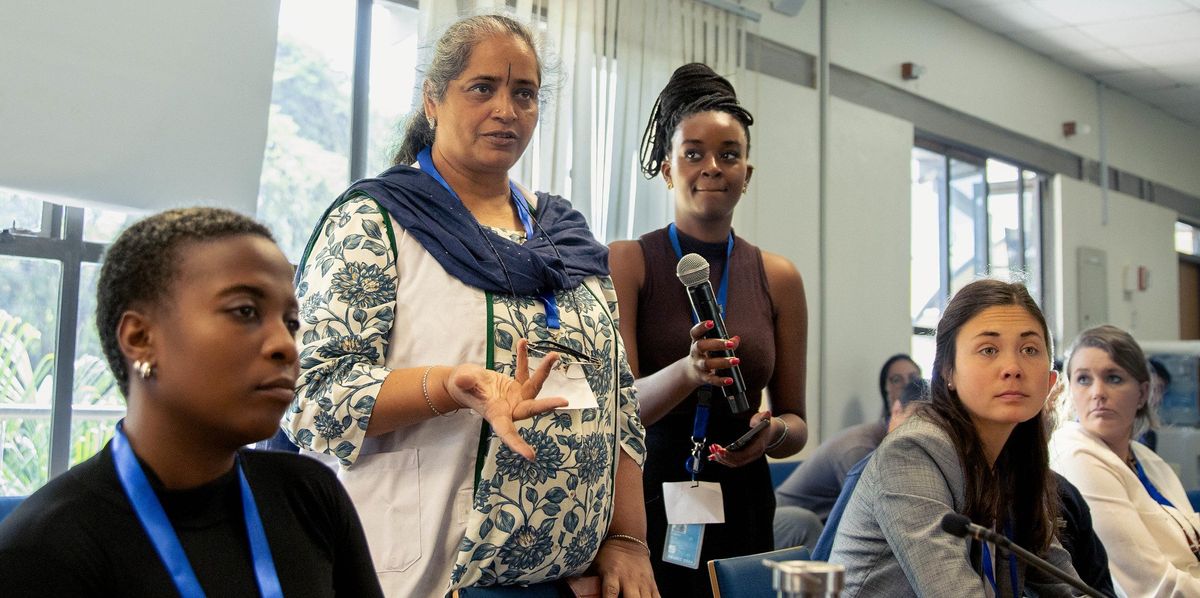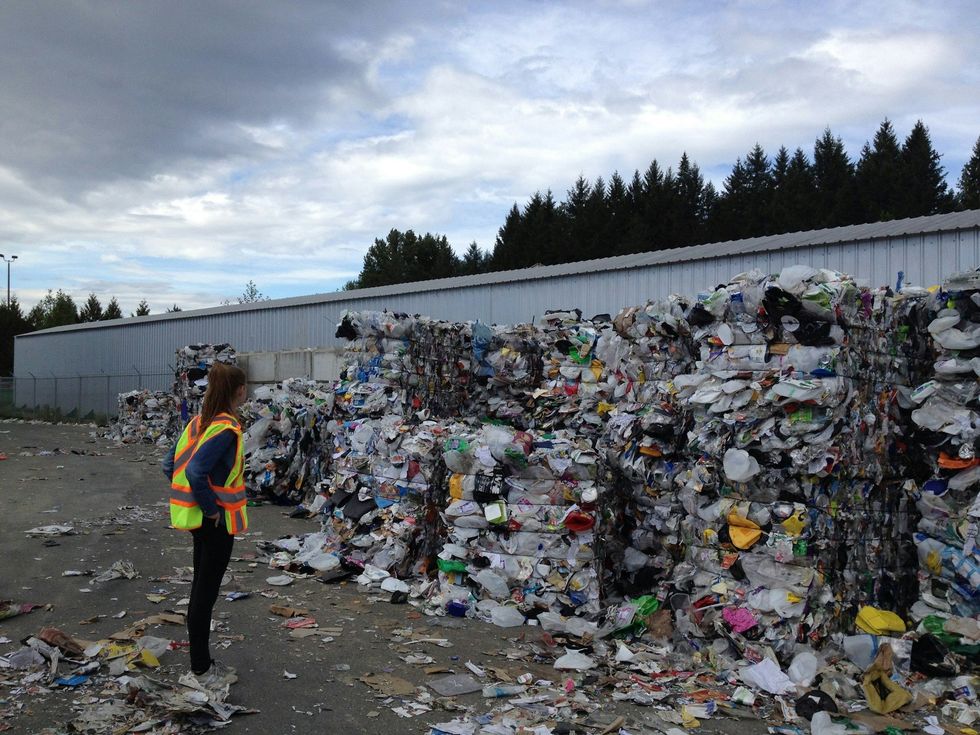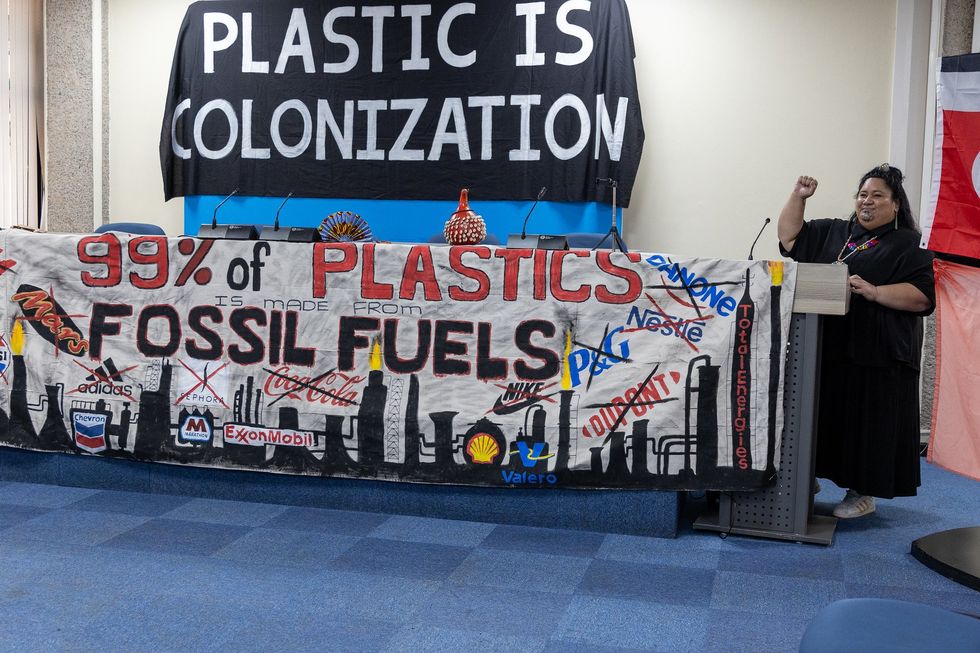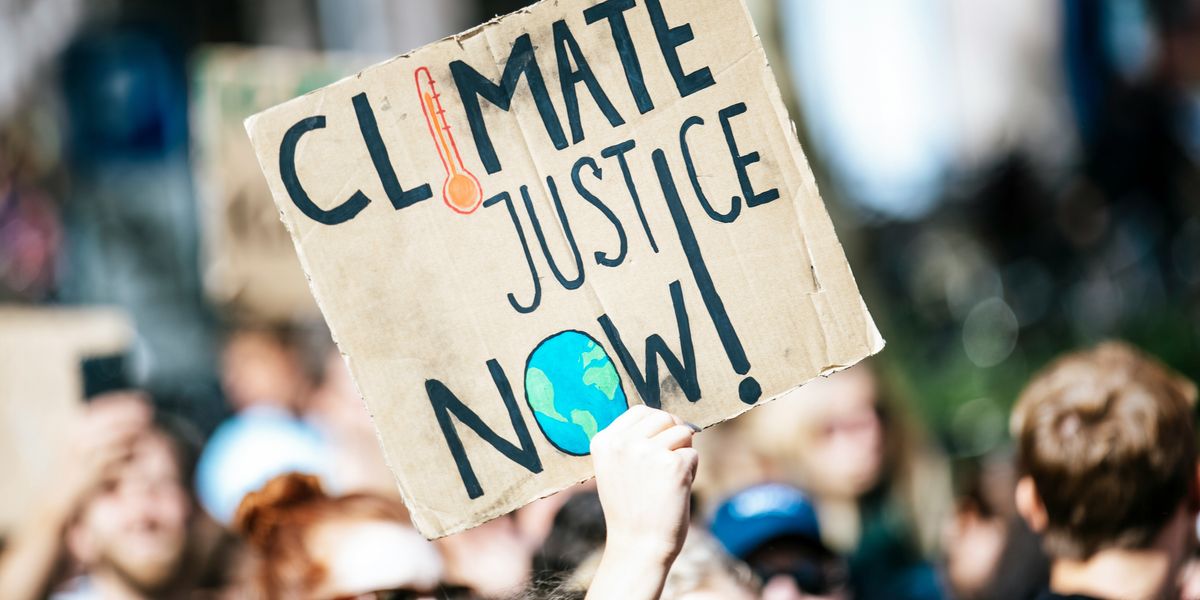
This will be a big year in shaping the future of chemical recycling
The controversial practice looms large in state environmental laws, federal regulation and global plastic treaty negotiations.
With a presidential election looming, a wave of state-level legislation circulating, an international plastics treaty taking form and fights brewing over proposed facilities, 2024 is set to shape the regulatory future of chemical recycling in the U.S.
As of September 2023, the 11 constructed chemical recycling facilities in the country are capable of processing 459,280 tons of waste plastic each year, using pyrolysis and gasification to convert it into fuel or chemicals that can then be used to create new plastic, according to a report from Beyond Plastics and IPEN (the International Pollutants Elimination Network). At full capacity, those facilities can process about 1.3% of the country’s plastic waste, the report found. Judith Enck, president of Beyond Plastics, told Environmental Health News (EHN) at least twice as many new facilities have been proposed, some of which haven’t yet advanced past a press release but all of which are emboldened by a flurry of state laws loosening regulations on the controversial practice.
In 2017, Florida became the first state in the country to exempt chemical recycling from solid waste regulations and ensure it would be regulated as manufacturing. The following year, Wisconsin and Georgia did the same, allowing facilities to skirt the environmental oversight of waste management plants while also opening them up to a larger universe of taxpayer subsidies, Enck said.
Twenty-four states have now passed similar legislation, according to the industry association American Chemistry Council, and bills are making the rounds in many more. Renee Sharp, strategic adviser for environmental health advocate Safer States, told EHN the environmental community was “caught flat-footed” by the spread of industry-backed laws that ease the development of new facilities. “We’ve been playing catch-up, but we’re catching up very fast,” she said.
A bill introduced in Maine last year was among the first state-level efforts to push back against the tide by declaring that “advanced recycling does not constitute recycling.” A failed Rhode Island bill, meanwhile, would have prohibited the construction of chemical recycling facilities. Peter Blair, policy and advocacy director for Just Zero, a waste-reduction advocate, said he expects that bill to be refiled this year and that more states will follow Maine’s lead.
Environmental advocates argue that advanced or chemical recycling is an insufficient answer to the plastics crisis that also pollutes neighboring communities. Enck called it “more of a marketing ploy than an actual solution to the problem.” She argues the “dismal” U.S. plastic recycling rate of 5% to 6% is a reason to reduce plastic production rather than supporting the status quo with chemical recycling.
Greenhouse gas emissions from plastic waste pyrolysis are also 10 to 100 times worse than those from the production of virgin plastic and the majority of output from the process comes in the form of process fuel, emissions and hazardous waste, the Beyond Plastics report found. Plastic additives that can be released during the chemical recycling process can “disrupt endocrine function and increase risk for male reproductive birth defects, infertility, obesity, cardiovascular disease, renal disease and cancers,” the report said.
Craig Cookson, senior director of plastics sustainability for the American Chemistry Council (ACC), said states’ interest in clearing the path for chemical recycling reflects a desire to “bring new, innovative businesses to their state. They’re looking to see how they can recycle a lot of the plastics that right now aren’t.”
As the ACC promotes legislation that recognizes chemical recycling as manufacturing, states are beginning to contemplate extended producer responsibility laws, which require companies to account for the end-of-life environmental costs of their products in an effort to reduce packaging and increase recycling volume. California, Colorado, Maine and Oregon have passed this type of legislation, while a new Maryland law has committed the state to studying the practice. Each of the laws, though, functions differently, and the devil is in the details, advocates said — namely, whether chemical recycling is considered as an effective tool alongside mechanical recycling. The approved rules don’t explicitly contemplate chemical recycling but may leave the door open by failing to prohibit its inclusion.
“Bad [extended producer responsibility] is worse than nothing,” Sharp said, as it would “give legislators and the public the impression that they’ve done something when actually nothing has been done.”
Legislation proposed in New York clearly prohibits chemical recycling from being counted in extended producer responsibility calculations, putting it front and center in the legislative battle, Enck said. She previously described the bill as “the most important environmental bill of the decade.”
Beyond these laws, federal regulations and requirements, global plastic treaty negotiations and community-level opposition will help shape the future of chemical recycling over the coming year, environmental advocates said.
The fight over facilities
With a growing number of states welcoming chemical recycling, Enck said at least 30 additional facilities have been proposed. Most notable among them are plants proposed in eastern Ohio and central Pennsylvania — two states among the 24 that consider chemical recycling as manufacturing — that have both drawn significant pushback.
SOBE Thermal Energy Systems has been planning to build a facility in Youngstown, Ohio, that would process discarded tires, plastic waste and used electronics. But Youngstown City Council established in December a one-year moratorium on pyrolysis and gasification plants, giving the community “time to catch their breath” and better understand the project’s potential impacts, Enck said. It was the first such moratorium passed in the country.
“Bad [extended producer responsibility] is worse than nothing." - Renee Sharp, Safer States
Meanwhile, in Point Township, Pennsylvania, Texas-based Encina hit a snag in its proposal to build a $1.1 billion plant that would operate at an unprecedented scale. Encina is eyeing a location along the Susquehanna River for a facility that would process 450,000 tons of plastic each year — as much as the country’s entire current capacity. But the company, which has faced opposition from environmental advocates and the local group Save Our Susquehanna, withdrew in October a key permit application after the state Department of Environmental Protection deemed portions of its plan “wholly inadequate,” delaying the project.
“Encina has become a model for how communities can raise their voices, speak up and let folks know about the concerns of a project,” Sage Lincoln, a legal fellow with the Clean Air Council, which previously brought a legal challenge to the facility’s development, told EHN. “You’re seeing the results of that in the close look regulators are taking at this project to make sure community concerns are addressed.”
Chemical recycling’s future at the federal level

The plastics industry is also promoting the inclusion of chemical recycling and the purchase of "recycling credits" – akin to carbon offsets – in calculations for a product’s recycled content.
Credit: Vivianne Lemay/Unsplash
At the federal level, the coming year could help dictate the future of chemical recycling, especially with the likelihood of increased rulemaking ahead of a possible administration change. Last year, the U.S. Environmental Protection Agency (EPA) withdrew a proposal by the Trump administration that relaxed clean-air regulations on chemical recycling facilities, but with so many states now operating with similar policies there may be more federal rulemaking to come. EPA press secretary Remmington Belford said the regulation of such facilities is “complex and based on a variety of legal and technical considerations.”
Environmental advocates are watching two areas in particular: the Federal Trade Commission’s Green Guides and the EPA’s approach to “mass balance,” a method for calculating a product’s recycled content. The Green Guides — the federal standards that govern environmental marketing claims — are due for revision this year, and industry groups, like the American Chemistry Council, have pushed to have them endorse chemical recycling, Blair said.
“Encina has become a model for how communities can raise their voices, speak up and let folks know about the concerns of a project." - Sage Lincoln, a legal fellow with the Clean Air Council
“If it includes language supporting advanced recycling, that will be a big sign of where things are going,” he added.
The plastics industry is also promoting the inclusion of chemical recycling and the purchase of "recycling credits" – akin to carbon offsets – in calculations for a product’s recycled content. Known as “mass balance,” this approach could find its way into both state legislation and federal regulations, Sharp said, putting a spotlight on any rules coming from the EPA.
Asked whether chemical recycling is part of an environmentally sound approach to the plastics crisis, EPA’s Belford said, “many approaches are needed to address the issues that plastics present. There are many concerns with chemical or thermoplastic processes that would need to be addressed.”
Global Plastic Treaty negotiations

The question arising from ongoing Global Plastic Treaty negotiations is whether the treaty will serve as an “enabler” of chemical recycling.
Credit: UNEP/Ahmed Nayim Yussuf
In the background of discussions about U.S. policy, negotiators from around the world are developing a global plastics treaty that would address the ongoing crisis. Chemical recycling hasn’t been addressed directly and is not specifically mentioned in the 70-page draft of the treaty that exists, according to Vito Buonsante, policy lead at the negotiations for IPEN, a network that supports civil society organizations in low- and middle-income countries. Nonetheless, he told EHN, “chemical recycling is always present there.”
The question arising from negotiations is whether the treaty will serve as an “enabler” of chemical recycling, Buonsante said, by considering it alongside mechanical recycling in extended producer responsibility and recycled content policies. The final treaty, which Buonsante said is unlikely to be ready by early 2025 (as planned), could define what is considered “environmentally-sound management” for plastics. If it does, that could open the door for the inclusion of chemical recycling, but agreement on the issue has been hard to come by. A spokesperson for the ACC said last year’s Basel Convention on hazardous waste left open a section of guidelines on chemical recycling because the parties couldn’t reach consensus.
"Many approaches are needed to address the issues that plastics present. There are many concerns with chemical or thermoplastic processes that would need to be addressed." - Remmington Belford, EPA
Environmental advocates said the U.S. hasn’t been ambitious enough at global treaty negotiations. Belford, the EPA spokesperson, said the U.S. approach to the treaty is “to be as ambitious as possible to protect human health and the environment. As a general matter, the U.S. also endeavors to align international goals with our domestic approaches to ensure that our commitments are implementable.”
The next session of negotiations is set to be held in Ottawa in late April.
Sharp said she and other environmental advocates are encouraged by a growing pushback against chemical recycling at the state level and by the emergence of legislative support at the federal level. As those domestic battles continue, the global negotiations could set the tone for the regulation of chemical recycling in the U.S. and beyond.
“We see this as an opportunity for the Biden administration to show their leadership on climate and the environment,” Sharp said. “We have seen some shifts in their positions toward a more pro-environment position and we’re hopeful we’ll see more.”














